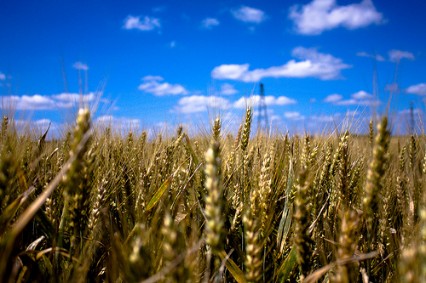Welcome to the World of Agricultural Biotechnology! Many people have never heard of agricultural biotechnology before, but hopefully this website will give you more of an understanding about what it is. Agricultural biotechnology is the movement of beneficial genes that produce beneficial traits and move them from one organism to another. By doing this in agricultural biotechnology, foods grown can become pest resistant, and crop yields can increase. The Creation of Agricultural Biotechnology: Agricultural biotechnology has been around for tens of thousands of years.The first traces of agricultural biotechnology go back to 1750 BC when the Sumerian's would brew beer. Agricultural Biotechnology in the modern day is being used to improve traits in different ways, such as in crops and animals.
"Biotechnology's been around almost since the beginning of time. It's cavemen saving seeds of a high-yielding plant. It's Gregor Mendel, the father of genetics, cross-pollinating his garden peas. It's a diabetic's insulin, and the enzymes in your yogurt." Former U.S. Agriculture Secretary Dan
Glickman How Agricultural Biotechnology is Applied: Scientist find specific traits that they would want in their specimen and through agricultural biotechnology they can successfully use the traits to enhance what they are genetically engineering. For example, corn is a crop found around the world, yet insects seem to feed on the crop everywhere it is grown, reducing the crop yield. Through agricultural biotechnology, scientists have put a trait in the corn that repel these insects, and therefore bring a higher crop yield. Farmers have found that using crops modified through biotechnology can reduce the need of plowing to control weeds, which leads to a better conservation of soil and water. With a reduction of plowing, farmers can also reduce the amount of fuel that they use, which decreases greenhouse gas emissions. Studies show that crops altered by biotechnology save farmers almost 441 gallons of fuel through reduced fuel operations, which has eliminated about 10.2 million pounds of carbon dioxide emissions since 1996. With a reduction in the use of plowing, there is also a decrease in soil erosion and soil compaction. |
Challenges of Agricultural Biotechnology: Even though agricultural biotechnology has been around for many years, there are still many challenges facing it. Recently, genetically engineered plants face a higher regulatory bar, which makes it harder for agricultural biotechnology to expand. Also, genetically engineered crops must pass through certain regulations before they may be sold. Most genetically engineered plants have to pass regulations passed by the Animal and Plant Health Inspection Service (APHIS). APHIS requires the company that is producing the plants to write a notice that describes the genes that have been put in the plant. The notice also has to have details about where the plant will be tested, and other questions relating to the experiment on the plant. After the company has finished testing the plant, APHIS has to review the results and determine if the product can be sold. All the regulations that are being passed are making it difficult for people to do research and develop new genetically engineered crops, which is keeping beneficial products from being sold, and is therefore raising the cost of products that do pass the regulations. The regulations that need to be passed for genetically engineered plants are some of the strictest rules among all scientific specialists. There are also challenges in foreign nations. People in the United States do not seem to be greatly opposed to foods produced by biotechnology, but there has been a strong anti-biotechnology movement in several European countries. On top of that, the European Union (EU) has created strong restrictions on the commercial planting of genetically modified plants, and European food processors and retailers are hesitant when it comes to importing harvested agricultural biotechnology products. Because of this, the United States grain exports is being jeopardized. |